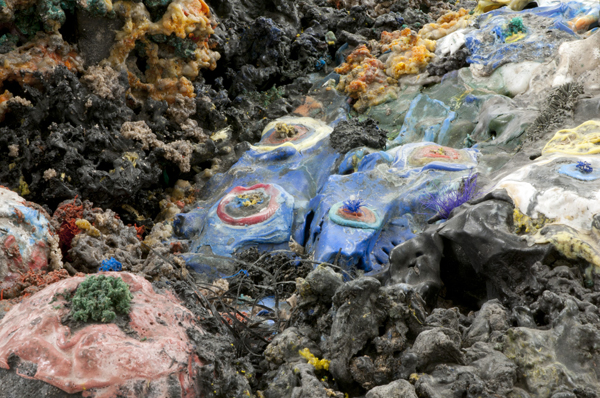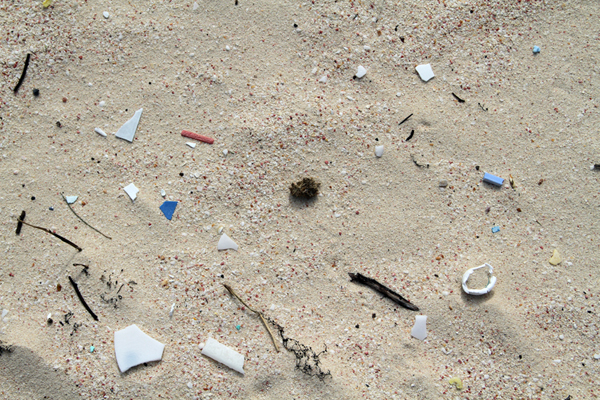Seminar at Hordaland Art Center, Bergen, Norway on March 9th 2013
From 1pm to 6pm
In this seminar which is organised in the framework of the exhibition of Plastic Reef we will look at the influence of plastic pollution from a future perspective through lectures by marine scientists, activists and an artist.
Maarten Vanden Eynde who will lead the seminar is a visual artist who worked for five years on the realisation of a monumental sculpture made up of plastic debris coming from the five ocean gyres, locations where plastic is accumulating because of the existing ocean currents. The sculpture Plastic Reef (2008-2012) has the characteristics of a coral reef, with all its nooks and crannies. However, more than hinting at what could be lost as a result of all the plastic in our oceans, it is a possible physical but surrealistic solution to the threat that plastic in the oceans pose to the marine environment.
The importance of marine environments to living beings, as well as land environments, is frequently under communicated. In light of this, we can see Plastic Reef as tangible proof of what scientists and ecologists are trying to make known through research and publication.
In this seminar we will look at the influence of plastic pollution from a future perspective. As plastic will create the fossils of the future, we are interested in short and long term effects, as well as mapping what is currently happening with the plastics that are floating in the world oceans. What are the global effects and implications of plastic presence in our environment? What is the possible threat for us, as the initial creators of this new material? And what will be our legacy? What will be our ‘Remnants of Tomorrow’?
As is poetically, yet matter-of-factly, described in Nav Haq’s text The Age of Plastic and After, published on the occasion of Maarten Vanden Eynde’s exhibition Plastic Reef, the proliferation of plastic in our world will lead to long-term damages. The text is concluded with this sentence: And the return of plastic into the ocean was eventually seen as symbolic of a cycle of failure, and, with it, of the delusion of the modern era.
—
Day programme:
13:00: Welcome by Maria Lyngstad Willassen, Hordaland Art Centre
13:10: Introduction by Maarten Vanden Eynde, artist
13:30: Kevin Thomas, Norwegian Institute for Water Research (NIVA), Oslo, Norway: Plastics in the marine environment and the potential risks they pose – with a focus on Norway
14:15: Chris Carroll, Seas at Risk, Brussels, Belgium: Possible legislative solutions and needed actions
15:00: Break
15:30: Marcus Eriksen, 5 Gyres Institute, Los Angeles, USA: Saving Our Synthetic Seas – about the work of the 5 Gyres Institute to document the global distribution of plastic marine pollution in the five subtropical gyres
16:15: Maarten Vanden Eynde, Future situations
16:30: Rounding up, group discussion
—
The seminar will be held in English. Participation is free and open to all. To secure a seat, please notify us of your participation before Wednesday 6th of March by e-mail: hks [at] kunstsenter.no.
—
Maarten Vanden Eynde is an artist who has devoted his life to exploring the mysteries of our future past by investigating the concept of Genetology, a self-invented ‘Science of First Things’ (www.genetology.net). His work is situated exactly on the borderline between the past and the future; sometimes looking forward to the future of yesterday, sometimes looking back to the history of tomorrow. He studied Free Media at the Gerrit Rietveld Academie in Amsterdam, The Netherlands. His postgraduate studies have included a year at the Mountain School of Arts in Los Angeles, USA, and two years at the Higher Institute of Fine Arts in Ghent, Belgium. In 2005 he founded the organisation Enough Room for Space, a mobile platform for site-specific projects, together with Marjolijn Dijkman.
Kevin Thomas is an environmental scientist who for the past 8 years has worked at the Norwegian Institute for Water Research (NIVA) as Research Manager for Ecotoxicology and Risk Assessment. His expertise lies in understanding the fate, behaviour, effects and risks of man-made substances in the environment and provides advice to national authorities and the EU. He is a highly cited author of over 100 peer-reviewed scientific papers that include reports on how particles behave and impact the aquatic environment. Kevin will coordinate a recently funded Research Council of Norway project ´Microplastic impacts on the marine environment (MIME)´that is due to start in late spring 2013.
Chris Carroll has been working on the issue of marine litter for the past three years for Seas At Risk, the European association of NGOs working to protect and restore to health the marine environment of European seas. Its members include Friends of the Earth Norway. During his time at Seas At Risk Chris has been involved in, and presented several submissions to EU and UN bodies that have looked at the problem of marine litter, and he is one of the co-authors in a recent EU publication ‘Marine litter: Technical Recommendations for the Implementation of MSFD Requirements’. At present Chris is co-ordinating two studies being carried out by Seas At Risk, that aim to evaluate the potential of legislation to tackle the problem of marine litter. Chris has often been quoted in the media regarding the topic of marine litter and at Seas At Risk. He is also responsible for communications activities.
Marcus Eriksen is currently the Executive Director and co-founder of the 5 Gyres Institute. He studies the global distribution and ecological impacts of plastic marine pollution, which has included expeditions sailing 35,000 miles through all 5 subtropical gyres to discover new garbage patches of plastic pollution in the Southern Hemisphere. In 2000 he travelled to Midway Atoll, finding hundreds of Laysan Albatross with plastic pouring out of their stomachs, and that experience narrowed his focus to plastics. He received his Ph.D. in Science Education from University of Southern California in 2003, months before embarking on a 2000-mile, 5-month journey down the Mississippi River on a homemade raft of plastic bottles to bring attention to this issue. Again in 2008, he rafted across the Pacific Ocean from California to Hawaii on JUNK, floating on 15,000 plastic bottles and a Cessina airplane fuselage as a cabin (junkraft.com). The journey, 2,600 miles in 88 days, brought attention to the work of the 5 Gyres Institute, the organization he co-founded with his wife Anna Cummins. The 5 Gyres Institute is committed to marine conservation through continued research, education and adventure, studying and lecturing about the plague of plastic waste in our watersheds and global ocean.

